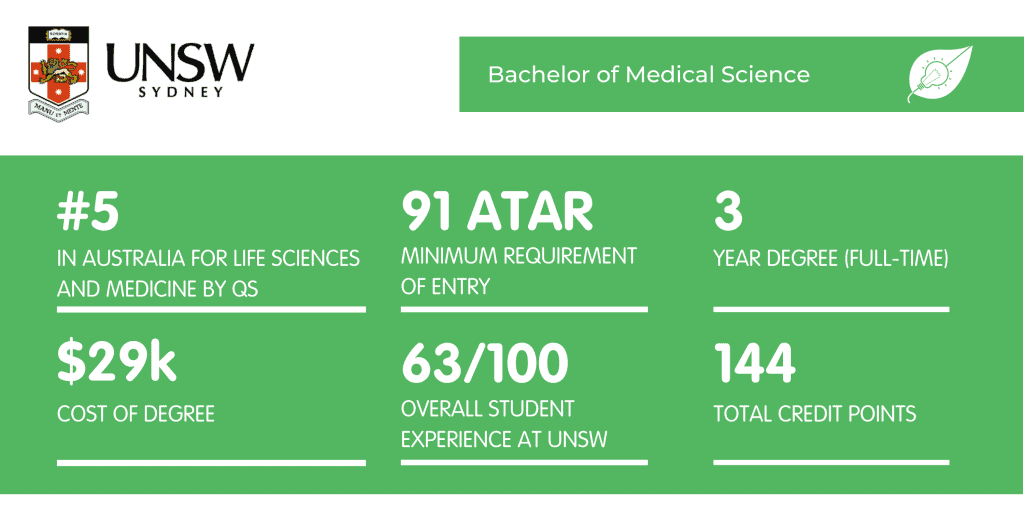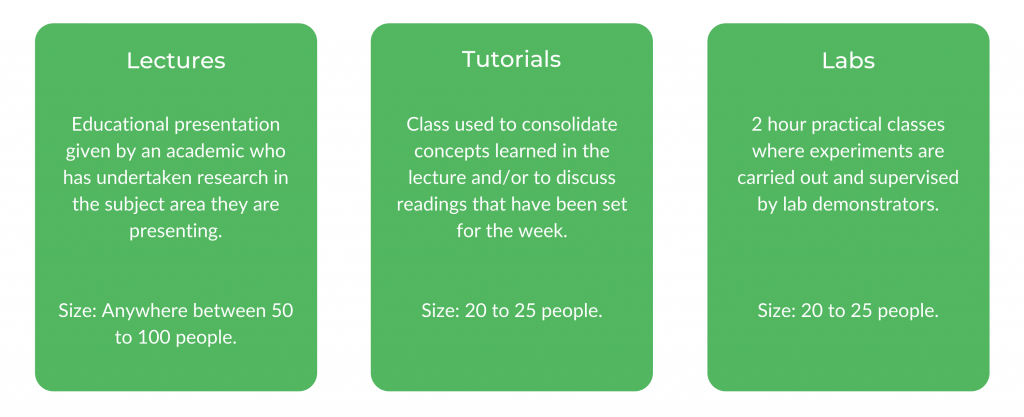
Has studying a Bachelor of Medical Science at UNSW tickled your fancy, but you’re still on the fence?
We can help! We have compiled the ins and outs of this degree, including, majors, assessments and uni culture!
Check it out!
What is a Bachelor of Medical Science at UNSW?
Core Units and Majors
How to Get into a Bachelor of Medical Science at UNSW
What’s the Teaching Format?
What’s the Faculty and Culture Like?
What is a Bachelor of Medical Science at UNSW?
The Bachelor of Medical Science at UNSW combines disciplines from Science and Medicine. Studying this degree revolves around the science and practice of medicine – it explores the functions of the human body, as well as the body’s response to disease and various drug treatments.
This degree forms a solid foundation for students who eventually want to become doctors, and will pursue further studies. However, even without the desire to pursue a career as a doctor, studying medical science would be worthwhile for someone who is fascinated by the way the human body operates!
Honours
Medical Science at UNSW students can complete Honours after the finalisation of their three-year degree. To be admitted into the Honours program, students must have a WAM (weighted average mark) of at least a credit.
Concluding your degree with an Honours year means that you’ll specialise in a research project on a topic of your choosing, with the help of tutors. Topics you may specialise in include, but aren’t limited to, Human Pathology, Biomedical Science, Medical Pharmacology, Molecular Genetics and Neurobiology.
Career Paths
If you end up with a degree in Medical Science, you may find yourself dabbling in:
- Medical research
- Pharmaceutical and biotechnology industries
- Market research and product development
- Forensic science
- Public health policy
What you learn may also prep you for a career as a lab technician or lab researcher. If you continue on with your studies, you could be well on your way to becoming a doctor.
Check out other career paths with a Medical Science degree here!
Studying Medical Science at Other Universities
UNSW isn’t the only university that offers this degree and choosing where you’ll complete your undergrad studies takes a lot of consideration. If you’re thinking about which university will best suit your needs, you can check out what it’s like studying Medical Science at ANU, UTS, WSU or USYD!
Core Units and Majors
The Bachelor of Medical Science at UNSW is unique to other university offerings. This is mainly because in the first and second year of the degree, every Medical Science students takes on the same core units — all subjects are preselected.
But in third year, students can carve their own paths and don’t even have to choose a major — giving them more freedom and flexibility with their subject choices.

What are the Core Units?
Core units within the Bachelor of Medical Science at UNSW are extremely varied, giving students a taste of everything before they decide to hone in on a specific discipline – or not! Two of the core units that you study are Anatomy for Medical Science and Chemistry 1A: Atoms, Molecules and Energy.
Within Anatomy for Medical Science, students ease into learning about the topographical anatomy of the whole human body. This subject is based on the study of human cases and examples and students become familiar with the musculoskeletal system and the nervous system.
Chemistry 1A: Atoms, Molecules and Energy builds onto the assumed knowledge students have from high school chemistry, bringing students a more in-depth understanding while introducing more concepts and ideas.
Majors
There are a broad range of potential majors that can be undertaken within this degree. You can choose from Anatomy, Biochemistry and Molecular Biology, Genetics, Microbiology and Immunology, Neuroscience, Pathology, Pharmacology and Physiology.
Are there built-in internships?
Internships are not compulsory for the Bachelor of Medical Science at UNSW, however, they are encouraged to be selected as a subject as part of their study! Facilitators help students find placements within their chosen disciplines — you can find more info here.
How to Get into A Bachelor of Medical Science at UNSW
For guaranteed entry into a Bachelor of Medical Science at UNSW, you will need to achieve an ATAR of 91. However, if you are unable to obtain this ATAR, don’t fret — there is another way to get into this degree.
The UNSW Preparation Program is one aimed at individuals aged 17 to 19 — who have already completed their HSC. Participants are given tailored training for 12 months in the disciplines that they’d eventually like to study and once completed, they may be able to enrol in a UNSW degree!
You can find more info about the program here!
Are there any prerequisites?
There are no prerequisite subjects for a Bachelor of Medical Science at UNSW, however there is assumed knowledge for this degree. For this course, it’s recommended that you’ve already studied Chemistry and Advanced Mathematics.
If you have not completed these subjects or feel you need to ‘fill in the gaps’ UNSW runs catch-up programs to allow students to gain the knowledge needed and to feel confident commencing their degree.
You can learn more about these classes here!
What scholarships are available?
UNSW offers a large range of scholarships for a variety of different means, to have a look and see if you are eligible, have a look here!
What’s the Teaching Format?
UNSW’s teaching format is different from most universities because they have trimesters. So there are three study sessions, each going for 10 weeks with breaks in between!
Class Structure
This content of a Bachelor of Medical Science at UNSW is delivered through lectures, tutorials and labs.

Within lectures, you and over 100 other students are taught a lot of theory across an hour. The lecturer tends to discuss new concepts, material and ideas to the class, so get comfortable because you’ll typically have three lectures per week for each subject.
After lectures, you’ll be discussing the content in a smaller classroom of 25 students for your tutorials – these tend to go for an hour. Within this space, you are able to ask questions, do activities and get a more in-depth understanding of the content covered in lectures.
The most interactive kind of learning will happen in labs, which are like high school science pracs times a million (but with only 25 students in the class)! They involve a practical implementation of the theoretical ideas discussed in tutorials and lectures, and usually run for two hours.
How often do you need to be on campus?
The contact hours for a Medical Science student are quite high! With the class contact time averaging to be around 19 to 21 hours per week, you’ll find yourself on campus quite a bit, so try to figure out where the best and cheapest eats are to keep yourself energised.
What are the assessments like?
Just like the degree itself, the assessments are presented in a broad and varying way! But here is a general guide as to what you can expect for each subject:
- Midterm assessment: This will be an exam on everything covered until halfway through a trimester.
- Assignments: This could be a group project, group presentation, or a group article review.
- Final Exam: This exam extensively covers anything and everything learned within the term!
Skills That You Refine and Learn

Researching is a skill that you will quickly harness in a Bachelor of Medical Science at UNSW! Utilising analysis of past papers and research by other scientists to come up with new and innovative ideas is a big part of the excitement of medical science.
Alongside writing, researching and analysing, practical skills are also developed through undertaking a Bachelor of Medical Science at UNSW. In practical labs, students learn real applications to the theory that they have been researching!
What’s the Faculty and Culture Like?
Since Medical Science falls into both the Faculty of Science and the Faculty of Medicine, there are many staff members working hard to educate UNSW students. Due to this and a large cohort, the experience with staff and students is described to be fairly impersonal until the third year of study.
Once you reach your final year, you will be able to establish a more personal and deep connection with your passionate and dedicated tutors!
Students at UNSW are dedicated, inclusive and helpful. They are also renowned for being able to put themselves out to help a classmate in need — but keep in mind that Medical Science is a bit of a competitive degree for the top marks!
Societies
UNSW hosts a large range of societies that love nothing more than to have students join them for fun and learning. A society relevant to Medical Science is, the Students of Medical Science Society where you are encouraged to mingle, chat and share your experiences with your cohort!
Mentorship Programs
There are also mentorship programs you can join, which can help you grow and prosper in uni life. Two mentoring groups related to Medical Science include:
Women in Science Peer Support: This group aims to mentor women in the STEM field throughout their whole degree, with the aim of seeing more women in STEM roles in a mostly male industry! Find out more here!
Faculty of Science Mentoring Program: This program runs from O-Week to the end of Term 1, with its aim to connect students with their peers and also has an option for students to be matched with a mentor from a year or so above them! Check them out here!
Wondering what the pros and cons of this degree are? Head here to find out more!
Matilda Elliott is a Content Writer at Art of Smart and a Communication graduate with a major in Journalism at Western Sydney University. You can find some of her published work in a range of platforms including SBS World News, The Music Network and within her own creative exploits with her twin sister. Matilda is a lover of listening, helping people to tell their stories, making genuine connections, clowning around in her circus troupe and dancing like no one is watching at live music shows!


